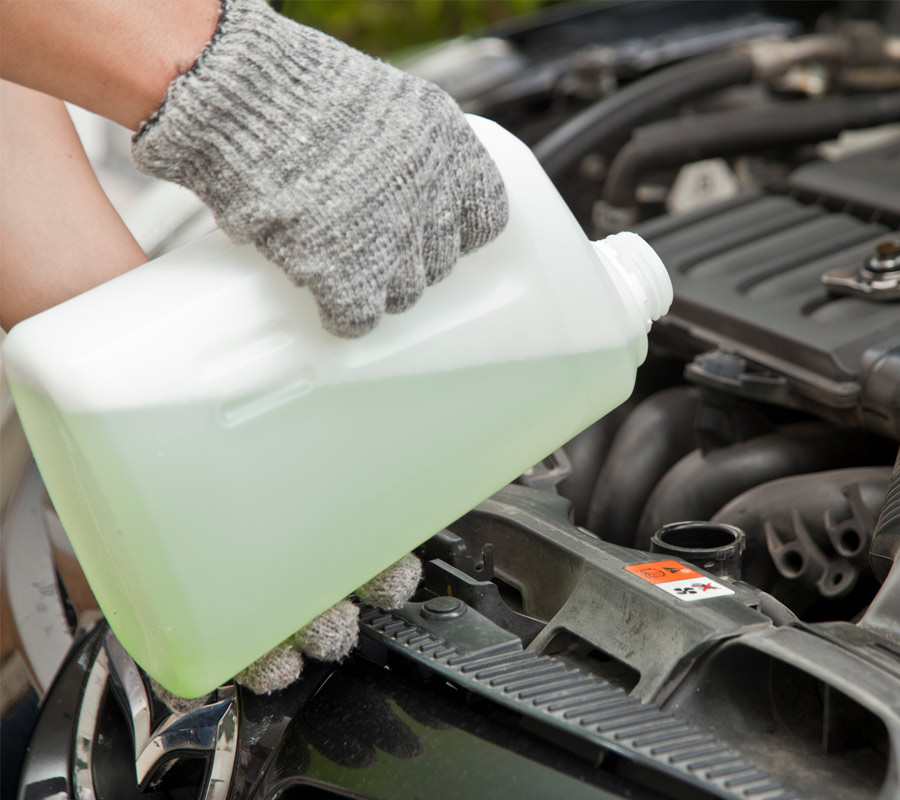Yes, you can use water as a coolant. But it’s not always the best choice.
Water can help in emergencies, but it has limits. Water is essential for cooling in many systems, including car engines and industrial machinery. It absorbs heat effectively and is widely available. However, using water alone as a coolant can cause problems.
It freezes at 32°F (0°C) and boils at 212°F (100°C). This can lead to overheating or freezing in your engine. Water also promotes rust and corrosion, which can damage metal parts. For these reasons, it’s often mixed with antifreeze, which lowers the freezing point and raises the boiling point. We’ll explore when and how water can be used as a coolant and the best practices to follow.

Credit: www.granvilleoil.com
Introduction To Water As Coolant
When considering a coolant, water often comes to mind. Water is abundant and cheap. But is it effective as a coolant? This section will explore the basics of using water as a coolant.
Why Consider Water?
Water is a natural coolant. It has a high specific heat capacity. This means it can absorb a lot of heat before it gets hot. Here are some reasons to consider water:
- Availability: Water is easy to find.
- Cost: Water is affordable.
- Efficiency: Water transfers heat well.
Common Applications
Many industries use water as a coolant. Here are some common applications:
| Industry | Application |
|---|---|
| Automotive | Radiators |
| Electronics | Cooling computer systems |
| Manufacturing | Cooling machinery |
Using water as a coolant can be effective in these areas. Always ensure it is used in a controlled environment.

Credit: natrad.com.au
Advantages Of Using Water
Water as a coolant has many advantages. It is a practical choice for many due to its unique properties. Let’s explore why water can be a good option for cooling systems.
Cost-effective
Water is inexpensive. It costs much less than specialized coolants. This makes it a great choice for those on a budget. Using water can save money over time. There are no hidden expenses associated with it. You can easily replace it without worrying about costs.
Readily Available
Water is easy to find. Almost everyone has access to it. You do not need to search for it. It is available in most households. This makes it very convenient. You can use it whenever needed without any hassle.
Environmentally Friendly
Water is eco-friendly. It does not harm the environment. There are no harmful chemicals in it. Using water as a coolant helps protect nature. It is a sustainable choice. This makes it an ideal option for those who care about the environment.
Disadvantages Of Using Water
Using water as coolant in your vehicle may seem practical. But it comes with several significant disadvantages. These drawbacks can affect the performance and longevity of your engine. Let’s explore some of the key disadvantages of using water as coolant.
Corrosion Risks
Water, especially tap water, contains minerals and impurities. These elements can cause corrosion in your engine’s cooling system. Over time, rust can build up and block the coolant passages. This leads to inefficient cooling and potential engine damage. The risk of corrosion is a major concern. This is why specialized coolants are often preferred.
Freezing Issues
Water has a freezing point of 0°C (32°F). In cold climates, this can be a major problem. If the water in the cooling system freezes, it can expand. This expansion can cause the engine block or radiator to crack. The damage from freezing water can be costly to repair. Using antifreeze mixed with water can prevent this issue.
Boiling Point Limitations
Water boils at 100°C (212°F) at standard atmospheric pressure. In a running engine, temperatures can exceed this boiling point. When water boils, it turns to steam. Steam is less effective at removing heat from the engine. This can lead to overheating and engine failure. Coolants have higher boiling points, making them more suitable for high-temperature environments.
Comparing Water To Traditional Coolants
Water as a coolant? Sounds simple, right? But how does it compare to traditional coolants? Let’s break it down.
Performance Differences
Water can absorb heat quickly. This makes it seem effective. Traditional coolants, like antifreeze, also absorb heat well. But they have additives. These additives prevent rust and corrosion. Water lacks these protective qualities. Over time, rust can damage your engine. Traditional coolants also work in extreme temperatures. Water can freeze in cold weather. It can boil in high temperatures. Both situations can harm your engine.
Cost Comparison
Water is cheap. You can get it from any tap. Traditional coolants cost more. They need to be bought from a store. But think about long-term costs. Using water can lead to rust. This rust can cause expensive repairs. Traditional coolants protect your engine. They might save you money in the long run. So, while water is cheaper upfront, it might cost more later.
Environmental Impact
Water is eco-friendly. It has no harmful chemicals. Traditional coolants contain chemicals. These can be harmful to the environment. Spilled coolant can contaminate water sources. Proper disposal is necessary. But water is safe to use and dispose of. It poses no threat to the environment.
Best Practices For Using Water
Using water as a coolant can be practical, especially in emergencies. Nonetheless, following best practices ensures your engine stays safe and efficient. Here are some essential guidelines to follow.
Proper System Maintenance
Maintaining your cooling system is crucial. Regularly check the radiator and coolant reservoir. Look for leaks and cracks.
- Inspect hoses: Ensure they are free from wear and tear.
- Flush the system: Remove old coolant and debris.
- Check the thermostat: Ensure it functions correctly to avoid overheating.
Proper maintenance extends the life of your engine.
Corrosion Inhibitors
Water alone can cause corrosion over time. Adding corrosion inhibitors helps protect the engine. These chemicals prevent rust and scale build-up.
| Corrosion Inhibitor | Benefits |
|---|---|
| Sodium Nitrite | Reduces rust |
| Silicates | Prevents scale build-up |
Use inhibitors recommended by your vehicle’s manufacturer for the best results.
Regular Monitoring
Monitor the coolant level and condition regularly. Check the color of the water. Clear water means it’s clean; rust-colored water means there’s corrosion.
Use a hydrometer to test the water. This tool measures the water’s freezing and boiling points.
- Check the coolant level weekly.
- Inspect for color changes.
- Use a hydrometer monthly.
Regular monitoring prevents unexpected engine failures.

Credit: goodcar.com
Water Quality Considerations
When considering using water as a coolant, understanding water quality is crucial. The quality of water can affect its cooling efficiency. It can also impact the longevity of your engine or cooling system. Let’s explore important factors like purity, mineral content, and pH levels.
Purity Requirements
Water purity is essential for effective cooling. Contaminants can cause blockages. They can also reduce heat transfer efficiency. Use distilled water or deionized water. These types are free from impurities. Tap water often contains impurities. This can lead to corrosion and scale buildup.
Mineral Content
Mineral content in water can be problematic. High mineral levels can cause scaling. This scaling can clog passages. It can also reduce cooling efficiency. Test water for minerals before use. Softened water is a better choice. It has fewer minerals.
Ph Levels
The pH level of water is another consideration. Water should have a neutral pH. A pH of 7 is ideal. Acidic or alkaline water can cause corrosion. This can damage your cooling system. Regularly check and adjust the pH level. Use additives if needed.
Case Studies And Real-world Examples
Exploring real-world examples can provide valuable insights into using water as a coolant. Various industries have successfully used water for cooling in different applications. Let’s dive into some case studies to understand its practical uses.
Industrial Applications
Many factories use water to cool heavy machinery. This helps maintain optimal temperatures. For instance, steel plants use water to cool molten metal. This process prevents overheating and ensures safety. Another example is power plants. They use water to cool turbines and generators. This promotes efficient energy production.
Automotive Uses
Water is often used in vehicle cooling systems. It helps prevent engines from overheating. For example, race cars use a mix of water and coolant. This ensures engines run smoothly under extreme conditions. Some older car models solely rely on water. They do not use any other coolant. This shows water’s effectiveness in automotive cooling.
Household Cooling Systems
Water is also used in home cooling systems. Evaporative coolers, or swamp coolers, are common in dry areas. They use water to cool the air. This method is energy-efficient and cost-effective. Some homes use water-based air conditioning systems. These systems are environmentally friendly. They reduce the need for chemical coolants.
Future Trends In Cooling Technologies
As technology advances, cooling systems for machines are evolving. One might wonder if water can be used as a coolant. Let’s explore the future trends in cooling technologies.
Innovative Solutions
In recent years, innovative solutions have emerged in cooling technologies. Many industries are seeking more efficient methods. Some of these include:
- Liquid immersion cooling
- Phase-change materials
- Microchannel heat exchangers
Liquid immersion cooling, for instance, submerges electronic components in a non-conductive liquid. This method offers better heat dissipation.
Phase-change materials absorb heat as they change from solid to liquid. This process helps maintain a stable temperature. It’s an efficient way to manage heat in electronic devices.
Sustainable Practices
With a growing focus on sustainable practices, the cooling industry is shifting towards eco-friendly solutions. Water is a natural coolant but using it efficiently requires sustainable methods. Consider these:
- Recycling water
- Using renewable energy sources
- Reducing chemical coolants
Recycling water in cooling systems can conserve resources. Industries are adopting closed-loop systems to reduce waste. Renewable energy sources like solar power help drive cooling systems without relying on fossil fuels.
Research And Development
Ongoing research and development are crucial for the future of cooling technologies. Scientists are exploring new materials and methods. They aim to improve efficiency and reduce environmental impact.
Universities and tech companies are investing in:
- Advanced materials research
- Energy-efficient designs
- Heat management techniques
Advanced materials like graphene have unique thermal properties. These materials can enhance cooling systems significantly. Energy-efficient designs focus on reducing power consumption. Innovative heat management techniques help in maintaining optimal temperatures with minimal energy use.
Frequently Asked Questions
Can Water Be Used As A Car Coolant?
Yes, but only in emergencies. Water lacks proper cooling properties for long-term use.
What Happens If You Use Only Water As Coolant?
Your engine may overheat. Water does not protect against rust or freezing.
Is Water A Good Substitute For Coolant?
No, coolant has additives to prevent corrosion and improve performance. Water alone is not effective.
Can You Mix Water With Coolant?
Yes, it is common. A 50/50 mix of water and coolant is recommended.
Why Is Coolant Better Than Water?
Coolant prevents rust, freezing, and overheating. It has additives to protect your engine.
Conclusion
Using water as a coolant has pros and cons. It’s accessible and cheap. But, it can cause corrosion and freezing issues. Antifreeze coolants offer better protection and performance. They prevent rust and withstand extreme temperatures. Always consider your engine’s needs.
Water alone might not be enough. A mix of water and coolant is usually best. Regular maintenance is key for engine health. Consult your vehicle’s manual for the right coolant type. This ensures optimal performance and longevity. Choose wisely to keep your engine running smoothly.

















